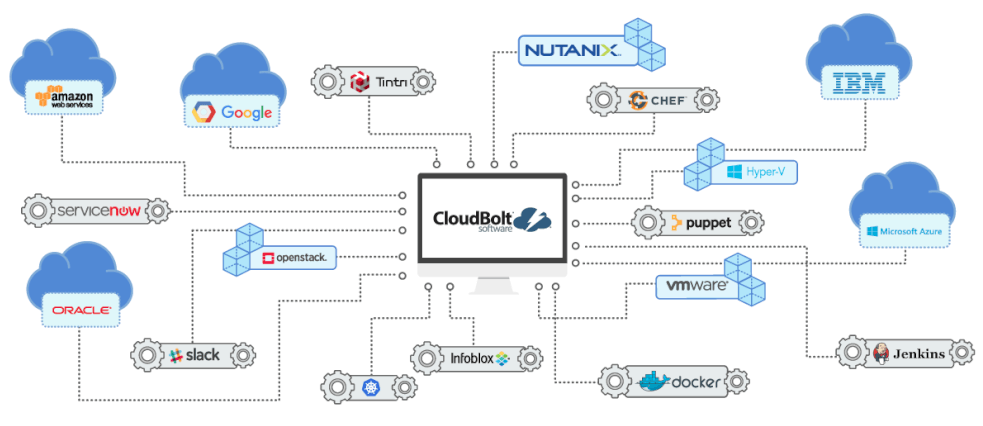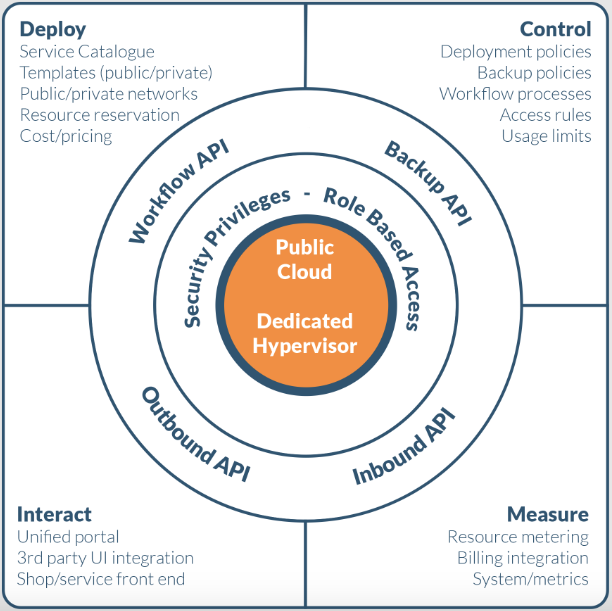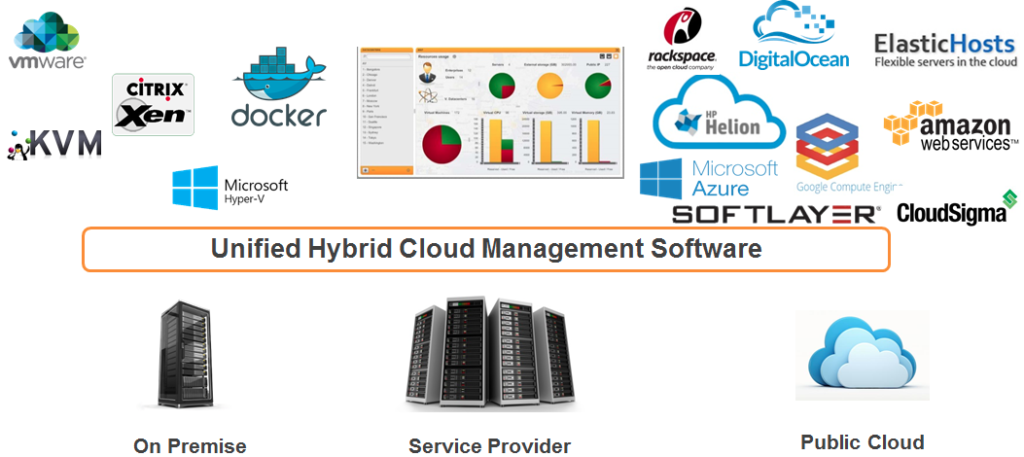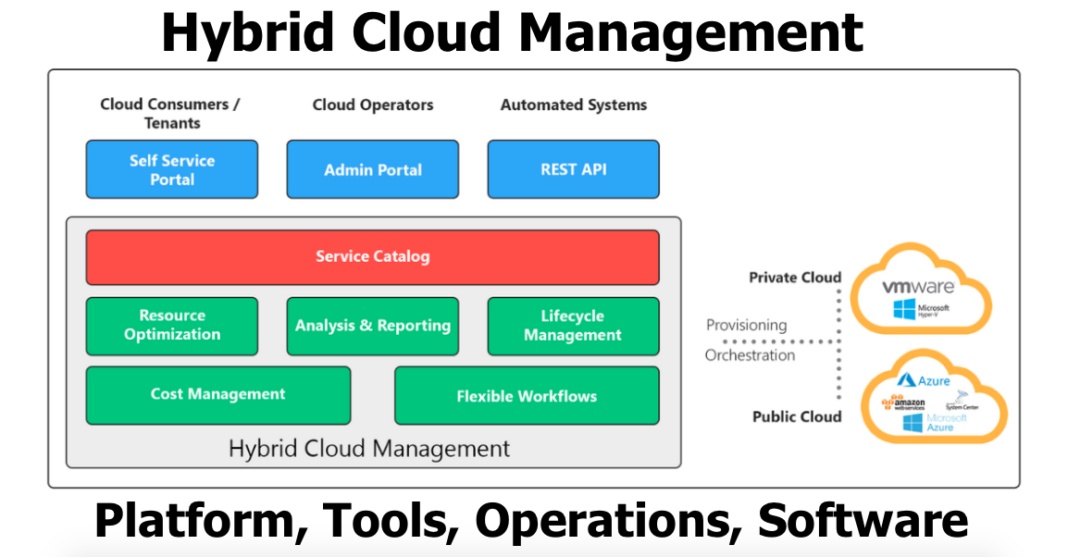Cloud computing has transformed the way organizations manage their IT infrastructure using different Hybrid Cloud Management Platform. With the rise of public cloud providers such as Amazon Web Services (AWS), Microsoft Azure, and Google Cloud Platform, many organizations have started migrating their applications and services to the cloud.
However, there are some limitations to public cloud computing, such as data security and compliance concerns; (see Cloud Migration & Deployment, Strategy, Benefits and Challenges). To address these issues, organizations are turning to hybrid cloud solutions, which combine public and private cloud infrastructure. In this article, we will discuss the challenges and benefits of hybrid cloud management.
What is Hybrid Cloud?
First, what is Hybrid Cloud Definition? Hybrid cloud is a computing environment that combines a public cloud provider such as AWS, Azure, or Google Cloud Platform, with a private cloud infrastructure. The private cloud can be on-premises, hosted in a data center, or managed by a third-party provider. The hybrid cloud model allows organizations to take advantage of the benefits of both cloud models, such as scalability, flexibility, and cost savings.
Challenges of Hybrid Cloud Management
Hybrid cloud management presents several challenges for organizations. Still, there are Healthy Ways to Guarantee Public Cloud Security. But first, the following are some of the key challenges:
- Complexity: Managing a hybrid cloud environment can be complex. The organization needs to manage two separate cloud environments, with different management interfaces and tools.
- Security: Security is a critical concern in a hybrid cloud environment. The organization needs to ensure that data is secure and compliant with regulatory requirements.
- Cost: Hybrid cloud solutions can be more expensive than public cloud or private cloud solutions. The organization needs to manage the cost of the hybrid cloud infrastructure, as well as the cost of data transfer and management.
- Data management: Managing data in a hybrid cloud environment can be challenging. The organization needs to ensure that data is available and accessible to applications in both the public and private cloud environments.
Benefits of Hybrid Cloud Management
Despite the challenges, hybrid cloud management offers several benefits to organizations. The following are some of the key benefits:
- Scalability: Hybrid cloud solutions offer scalability, allowing organizations to quickly scale up or down their IT infrastructure based on business needs.
- Flexibility: Hybrid cloud solutions offer flexibility, allowing organizations to choose the best cloud model for their specific requirements.
- Cost savings: Hybrid cloud solutions can provide cost savings by allowing organizations to use the public cloud for non-sensitive workloads, while keeping sensitive workloads on a private cloud.
- Reliability: Hybrid cloud solutions can improve reliability by providing redundancy across both public and private cloud environments.
Best Practices for Hybrid Cloud Management
The following are some best practices for hybrid cloud management:
- Design a hybrid cloud architecture that meets the organization’s specific requirements.
- Use a single management console to manage both public and private cloud environments.
- Ensure that data is secure and compliant with regulatory requirements.
- Use automation to simplify management tasks and improve efficiency.
- Monitor and optimize the hybrid cloud environment to ensure that it is performing optimally.
Hybrid Cloud Technology New Updates:
- Hybrid Cloud Security Puzzle: Integrated Solutions for Cloud Computing
- Some Hybrid Cloud Security Risks Challenges and How to Repair them
- Public & Private Hybrid Cloud Hosting and Computing Solutions
- Hybrid Cloud Hosting: Uses and Best Practices
Hybrid Cloud Management Tools
As businesses increasingly adopt cloud technologies, hybrid cloud management tools have become critical in managing and optimizing resources across various cloud environments. A hybrid cloud environment combines private and public cloud services, and managing these diverse environments requires specialized tools that can integrate and automate processes across different cloud platforms.

Hybrid cloud management tools enable organizations to manage their cloud infrastructure in a single view, regardless of whether it is on-premise or in the cloud. The tools provide a range of features, including cloud automation, orchestration, monitoring, and security, to ensure optimal performance and cost-effectiveness.
Examples of Hybrid Cloud Management Tools
Here are some examples of hybrid cloud management tools that are commonly used in the industry:
1. Microsoft Azure Arc:
First, the Microsoft Azure Arc is a hybrid cloud management tool that enables users to manage their resources across multiple environments. This also includes on-premises, edge, and multi-cloud. It provides a unified management experience, allowing users to manage their resources using Azure services, such as Azure Policy, Azure Security Center, and Azure Monitor.
2. VMware vRealize Suite:
The VMware vRealize Suite is a hybrid cloud management platform that enables organizations to manage and automate their infrastructure across private and public clouds. It provides a range of features, including cloud automation, self-service, and infrastructure monitoring. The tool supports multiple clouds, including VMware Cloud on AWS, Microsoft Azure, and Google Cloud Platform.
3. IBM Cloud Pak for Multicloud Management:
Generally, IBM Cloud Pak for Multicloud Management is a hybrid cloud management tool that enables organizations to manage their cloud infrastructure from a single dashboard. It provides a range of features, including application deployment, automation, and management of infrastructure and services across multiple clouds, including IBM Cloud, Amazon Web Services, and Microsoft Azure.
4. Cisco CloudCenter:
In the first instance, Cisco CloudCenter is a hybrid cloud management tool that enables organizations to manage their cloud infrastructure across multiple clouds. Normally, these includes AWS, Microsoft Azure, and Google Cloud Platform. It provides a range of features, including workload migration, automation, and governance, enabling organizations to optimize their cloud infrastructure for performance and cost.
5. Red Hat CloudForms:
This Red Hat CloudForms is a hybrid cloud management tool that enables organizations to manage their infrastructure across multiple clouds, including AWS, Microsoft Azure, and Google Cloud Platform. It provides a range of features, including policy-based management, automation, and governance, enabling organizations to optimize their cloud infrastructure for performance and cost.
Take Away
A hybrid cloud management tool is critical for managing and optimizing resources across different cloud environments. The tools provide a range of features, including cloud automation, orchestration, monitoring, and security, enabling organizations to manage their cloud infrastructure from a single dashboard. The examples provided above are just a few of the many hybrid cloud management tools available in the market, and organizations should choose the one that best fits their needs and requirements.
Hybrid Cloud Management Platforms
A hybrid cloud management platform is a software solution that enables organizations to manage their computing resources across multiple cloud environments, including private and public clouds. It allows users to manage workloads, data, and applications seamlessly across different cloud environments.

Hybrid cloud management platforms typically provide a centralized console or dashboard for managing and monitoring various cloud resources, such as virtual machines, storage, and networks. They also provide tools for automating tasks, such as provisioning and scaling resources, and for optimizing resource utilization and cost.
One of the key benefits of a hybrid cloud management platform is that it allows organizations to take advantage of the benefits of both private and public clouds. For example, they can keep sensitive data and applications on-premises or in a private cloud, while leveraging the scalability and flexibility of a public cloud for less sensitive workloads.
Another advantage of hybrid cloud management platforms is that they can help organizations avoid vendor lock-in by providing the ability to move workloads and data between different cloud environments. This flexibility enables organizations to choose the best cloud for each workload based on factors such as performance, security, and cost.
Examples of Hybrid Cloud Management Platforms for Software Testing
Here are some examples of hybrid cloud platforms:
- Amazon Web Services (AWS) – AWS offers a range of hybrid cloud solutions, including AWS Outposts, AWS Hybrid Cloud, and AWS Transit Gateway.
- Microsoft Azure – Azure provides several hybrid cloud options such as Azure Arc, Azure Stack, and Azure Hybrid Benefit.
- Google Cloud Platform (GCP) – GCP offers a hybrid cloud solution called Anthos, which allows customers to manage and deploy applications across both on-premises and cloud environments.
- IBM Cloud – IBM Cloud has a hybrid cloud offering called IBM Cloud Private, which enables customers to build, deploy, and manage applications across multiple cloud environments.
- Oracle Cloud – Oracle Cloud provides a hybrid cloud solution called Oracle Cloud at Customer, which allows customers to run Oracle Cloud services in their own data centers.
- VMware Cloud – VMware provides several hybrid cloud options, including VMware Cloud on AWS, VMware Cloud on Dell EMC, and VMware Cloud on IBM Cloud.
These are just a few examples of the many hybrid cloud platforms available today.
Examples of Hybrid Cloud Management Platforms
Here are some examples of hybrid cloud management platforms:
- IBM Cloud Pak for Multicloud Management – This platform offers a unified management experience for hybrid and multicloud environments, enabling organizations to manage their applications and workloads across multiple cloud providers.
- Red Hat OpenShift – OpenShift is a container application platform that enables organizations to deploy, manage, and scale containerized applications across hybrid and multicloud environments.
- VMware vRealize Suite – This suite of cloud management tools provides a unified management experience for hybrid cloud environments, enabling organizations to automate and optimize their IT operations across multiple cloud providers.
- Cisco CloudCenter Suite – CloudCenter Suite offers a centralized platform for deploying and managing applications across hybrid cloud environments, providing organizations with visibility, control, and governance over their cloud resources.
- Microsoft Azure Arc – Azure Arc is a hybrid cloud management platform that enables organizations to manage and govern their applications and workloads across on-premises, multi-cloud, and edge environments.
- Dell Technologies Cloud Platform – This platform provides a unified management experience for hybrid cloud environments, enabling organizations to deploy, manage, and scale their applications across multiple cloud providers.
These are just a few examples of the many hybrid cloud management platforms available today.
In a nutshell, hybrid cloud management platforms can help organizations optimize their cloud computing resources, reduce costs, and increase agility and flexibility.
Hybrid Cloud Operations
Hybrid cloud operations is the management and orchestration of resources across multiple environments, typically a combination of public cloud services and private infrastructure.

In a hybrid cloud environment, companies can leverage the benefits of both public and private cloud infrastructure. Public clouds offer scalability, flexibility, and cost savings, while private clouds provide greater control over security and compliance. Hybrid cloud operations enable companies to seamlessly manage workloads and data across these environments.
To effectively manage hybrid cloud operations, companies need to implement a unified management system that can automate provisioning, orchestration, and monitoring of resources across all environments. This can involve deploying tools for workload migration, load balancing, security, compliance, and performance monitoring. It also requires a comprehensive understanding of the unique requirements and limitations of each cloud environment, as well as the ability to integrate and manage data across multiple platforms.
Hybrid Cloud Management Services
Hybrid cloud management services refer to a set of services that help organizations manage their hybrid cloud environments. A hybrid cloud environment typically consists of a combination of private cloud resources and public cloud resources, and these resources are integrated to work together seamlessly.

Hybrid cloud management services can help organizations monitor and manage their hybrid cloud infrastructure, automate tasks, and optimize resource usage.
Features of Hybrid Cloud Management Services
Some of the key features of hybrid cloud management services include:
- Cloud monitoring: These services can provide real-time monitoring of your cloud environment, enabling you to track resource usage, identify performance issues, and troubleshoot problems.
- Automation: Hybrid cloud management services can automate routine tasks such as backups, scaling, and security updates, freeing up IT staff to focus on more strategic tasks.
- Resource optimization: These services can help you optimize your cloud resources, ensuring that you are using them efficiently and minimizing waste.
- Cost management: Hybrid cloud management services can help you track and manage your cloud costs, enabling you to identify areas where you can save money and avoid unexpected bills.
- Security and compliance: These services can help you ensure that your hybrid cloud environment is secure and compliant with industry regulations and standards.
Lastly, hybrid cloud management services can help organizations improve the efficiency, scalability, and security of their hybrid cloud environments.
Hybrid Cloud Management Software
Hybrid cloud management software is a type of software that enables organizations to manage and control their hybrid cloud infrastructure.

Examples of hybrid cloud management software
Some examples of hybrid cloud management software include:
- VMware vRealize Suite: This software provides a comprehensive platform for managing hybrid clouds, including automation, monitoring, and optimization tools.
- Red Hat CloudForms: This is an open-source cloud management platform that provides a unified management interface for hybrid cloud environments.
- Microsoft Azure Stack: This software enables organizations to create a hybrid cloud by combining Azure services with their own data center infrastructure.
- Cisco CloudCenter: This platform provides a single interface for deploying and managing applications across multiple clouds, including public, private, and hybrid clouds.
- BMC Helix Multi-Cloud Service Management: This software provides a centralized platform for managing and governing services across multiple clouds, including hybrid clouds.
These are just a few examples of the many hybrid cloud management software solutions available. When choosing a hybrid cloud management software, it’s important to consider factors such as cost, scalability, security, and ease of use.
Conclusion
Hybrid cloud management presents several challenges and benefits to organizations. You can see our previous post on How to fix hybrid cloud issues. While it can be complex and costly to manage a hybrid cloud environment, the benefits of scalability, flexibility, cost savings, and reliability make it an attractive option for many organizations. By following best practices for hybrid cloud management, organizations can successfully manage their hybrid cloud environments and take advantage of the benefits of this model.
Recommended Articles
- Hybrid Cloud Types, Storage, Examples and How it Works
- DevOps Engineer’s Guide to Kubernetes Operating Systems
- How I Got Rid of My Hybrid Cloud Tech Management Headache
- Multi Cloud – Approach, Strategies, Implementations, App Management


![10 Best Udemy Docker and Kubernetes Courses & Tutorials 10 Best Udemy Kubernetes Courses & Tutorials [2021]](https://hybridcloudtech.com/wp-content/uploads/2021/01/10-Best-Udemy-Kubernetes-Courses-Tutorials-2021-100x70.jpg)




